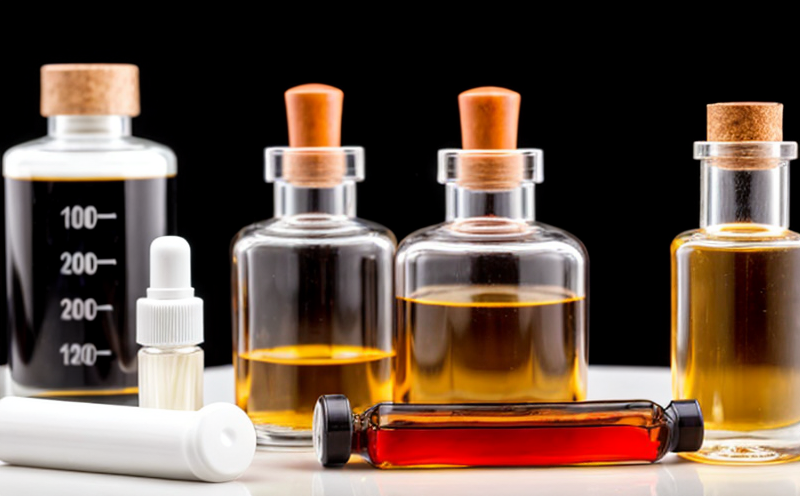Veterinary Vaccine Chemical Testing
The demand for safe and effective veterinary vaccines has grown significantly in recent years. Ensuring that these vaccines meet the highest standards of quality and safety is a critical responsibility, especially given their impact on animal health and welfare across various sectors such as agriculture, pet care, and public health.
Veterinary vaccine chemical testing encompasses a broad range of analytical procedures aimed at assessing the purity, potency, and stability of these vaccines. This service involves meticulous examination to ensure that the vaccines contain no harmful contaminants or impurities and meet all regulatory requirements set by international standards like ISO and EU directives.
The process typically begins with the collection and preparation of samples from various batches of vaccines. These samples are then subjected to a series of sophisticated analytical techniques, including high-performance liquid chromatography (HPLC), mass spectrometry (MS), and Fourier-transform infrared spectroscopy (FTIR). Each technique plays a crucial role in identifying the presence or absence of specific components within the vaccine formulation.
One of the primary challenges in veterinary vaccine testing is ensuring that the vaccines are free from endotoxins, which can cause adverse reactions. The Limulus Amoebocyte Lysate (LAL) test is often employed to detect these contaminants. Additionally, testing for residual solvents and other excipients is essential to ensure that they do not exceed acceptable limits as defined by regulatory bodies.
The analytical methods used in this service are designed to provide precise and reliable data on the chemical composition of vaccines. This information is vital for ensuring that the vaccines are safe for use, particularly when administered to animals with different sensitivities or immune systems. The results of these tests are typically reported in detailed certificates of analysis (COA), which serve as critical documentation for regulatory compliance and quality assurance.
By adhering to stringent testing protocols and utilizing advanced instrumentation, our laboratory ensures that every batch of veterinary vaccine undergoes rigorous scrutiny. This commitment to excellence not only enhances the reliability of the vaccines but also contributes significantly to public health and animal welfare. Our expertise in this area allows us to provide comprehensive support to pharmaceutical manufacturers, research institutions, and regulatory bodies.
Our team of highly skilled scientists and engineers is dedicated to staying at the forefront of technological advancements in veterinary vaccine testing. We continuously invest in state-of-the-art equipment and training programs to ensure that we can meet the evolving needs of our clients. By offering this specialized service, we aim to foster trust and confidence in the safety and efficacy of veterinary vaccines.
Benefits
The benefits of thorough veterinary vaccine chemical testing are manifold. For pharmaceutical manufacturers, it ensures compliance with stringent regulatory requirements and helps maintain a strong market reputation. Reliable test results contribute to the development of safe and effective vaccines that can be trusted by veterinarians and pet owners.
From an operational standpoint, this service minimizes the risk of product recalls or withdrawals due to contamination issues. It also facilitates smoother interactions with regulatory authorities, thereby streamlining the approval process for new products. For research institutions, our testing capabilities support cutting-edge studies on vaccine efficacy and safety.
The impact extends beyond the immediate stakeholders to encompass broader societal benefits. By ensuring that vaccines are free from harmful contaminants, we contribute to the overall health and well-being of animals across various sectors. This service plays a crucial role in safeguarding public health by preventing zoonotic diseases and promoting responsible animal husbandry practices.
In summary, veterinary vaccine chemical testing is an indispensable component of quality assurance and regulatory compliance. It underscores our commitment to providing reliable data that supports the development and distribution of safe and effective vaccines.
Industry Applications
The application of veterinary vaccine chemical testing spans multiple sectors including agriculture, pet care, and public health. In the agricultural sector, this service ensures that livestock are protected against diseases effectively while minimizing the risk of contamination. For pet owners, it provides peace of mind knowing that their pets receive safe and reliable vaccines.
In the realm of public health, our testing contributes to disease prevention efforts by ensuring that vaccines do not pose risks to human health. This is particularly important in preventing zoonotic diseases which can be transmitted from animals to humans. Additionally, this service supports research into novel vaccine formulations and delivery methods aimed at addressing emerging challenges in animal health.
Our laboratory's expertise in veterinary vaccine chemical testing enables us to cater to diverse client needs across these sectors. Whether it is ensuring compliance with EU directives or supporting cutting-edge research projects, we are committed to delivering high-quality analytical results that meet the highest standards of integrity and reliability.
Customer Impact and Satisfaction
The impact of thorough veterinary vaccine chemical testing on our customers is profound. By ensuring that vaccines meet all regulatory requirements and industry standards, we enhance customer trust in both our laboratory services and the products being tested.
Our comprehensive approach to testing ensures that every batch of vaccine undergoes rigorous scrutiny, resulting in reliable data and detailed reports that are essential for regulatory compliance and quality assurance. This not only supports pharmaceutical manufacturers but also facilitates smoother interactions with regulatory authorities.
The benefits extend beyond just the immediate stakeholders. By ensuring the safety and efficacy of vaccines, we contribute to broader societal impacts such as disease prevention efforts and responsible animal husbandry practices. Our commitment to excellence in this area fosters a sense of trust and confidence among all parties involved.
Customer satisfaction is our top priority. We aim to provide reliable data that supports the development and distribution of safe and effective vaccines, thereby enhancing public health outcomes. By adhering to stringent testing protocols and utilizing advanced instrumentation, we ensure accurate and consistent results across all batches tested.





